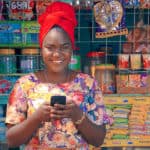Helping the Digital Revolution Reach the Corner Store: Piloting Mobile Solutions for Micro-Retailers
The Hope Shop is a small “duka,” or corner store, where residents of the low-income Nairobi suburb of Githurai can buy a host of basic, essential goods. But for the 33-year-old owner, Peninah Karemi, managing the shop was once a challenge. With her limited record-keeping skills, Karemi had no way to calculate the shop’s profitability or keep track of stock; often, it was only when a customer would ask for a certain item that she would realize she’d run out.
Across the developing world, there are millions of entrepreneurs like Karemi: shopkeepers with a desire to build businesses that serve their communities, but without the tools to do so effectively. Many of the shopkeepers are not entrepreneurs by choice, but rather migrate to the sector because of a lack of other opportunities. Without training in business and management skills, they often struggle to run a shop. For example, a study found that more than half of duka owners in Nairobi do not record any sales, and an additional 40 percent only record such data manually. Without accurate records on sales, inventory and profits, the entrepreneurs can’t make good business decisions.
Can digital tools help shopkeepers address these pressing challenges? That was the question that TechnoServe sought to answer by piloting a smartphone platform among participants in its Smart Duka program, an initiative that—with the support of the Citi Foundation and elea Foundation—worked with shopkeepers in Kenya to improve the operations of their stores.
An essential sector
Why is it important to improve the performance and growth of micro-retailers? Small shops help to form the economic backbone of many communities. If retail shops can become more profitable and grow, they will generate more employment in communities where jobs are scarce, and broaden the range of products and services available in communities where large retailers don’t operate.
In Kenya, for example, retail is one of the leading sources of employment in cities and towns, and small, informal shops account for 70 percent of all retail revenue in the country. Meanwhile, an estimated 95 percent of Kenyans shop at dukas, and these stores are often the only source of basic consumer goods for base-of-the-pyramid populations.
Designing mobile tools for shopkeepers
To address this opportunity, the Smart Duka program sought to develop and test mobile tools that would help duka owners better understand and manage their businesses. After conducting surveys with the store owners, the program decided to develop a product focused on facilitating better record-keeping and inventory management. Cash management and an ordering system to replenish stock were also identified as functions that would be attractive in a future application, but that fell outside the scope of the pilot.
The program partnered with Buymore POS, a Kenyan technology firm, to tailor a mobile app that would meet the needs of duka owners, and TechnoServe trained 31 entrepreneurs, including Karemi, on the application’s use. Entrepreneurs were shown how to enter information about their inventory and each sale into the app.
The impact of mobile tools
The 10-month pilot showed that mobile tools have enormous potential to benefit micro-retailers. The application was able to capture nearly 70 percent of all sales at participating dukas, a major improvement over past record-keeping systems. This allowed the entrepreneurs to understand which products were generating the best margins and the overall profitability of the store. “I can easily capture sales in the shop, and the [application] would give me an accurate record of what my sales and profit margin are on a daily basis,” said Karemi.
The inventory management module allowed entrepreneurs to recognize when they needed to order new products, as well as identify the products that were sitting on their shelves for months at a time—it turned out that half of the unique products on offer at an average duka did not sell within a month, tying up the businesses’ working capital. The system helped the duka owners understand the movement of their stock, and make better decisions about their product mix.
Because many consumers purchase products on credit, the ability to record sales data allowed the duka owners to better track the credit they had extended, enabling them to recover 30 percent more from these transactions. “I am now able to record my debtors in the app. I get reminders on when any debt is due and the amount. This helps me recover more debt from my customers and leads to more sales, as I would now give products on credit and still recover,” said Karemi.
An additional, unforeseen benefit was improved transparency within the businesses—the shopkeepers (often spouses) could see all of the sales data and be accountable to one another.
Limitations and lessons learned
Nevertheless, the pilot demonstrated some limitations in how the mobile app was used by the entrepreneurs. For example, during the busiest hours at the dukas, the data-entry process in the app proved too onerous for some shopkeepers to record sales data. The program rolled out a scanning feature as an alternative, but not all camera phones were able to scan properly.
There were also technical challenges, as different shopkeepers had different Android phone models, which led to some bugs for some users. Additional pre-rollout testing across phones is necessary to ensure better performance. Also, the application was typically installed only on the phone used by the duka owner; when family members or employees filled in, they often did not use the app. Additional resources are required to install and onboard additional users at each store.
As TechnoServe continues to work with a number of partners to support the growth of micro-retailers in Kenya and elsewhere in Africa, we see enormous potential in mobile tools. A digitally connected duka can create shared value for many stakeholders, providing real-time financial data for lenders, forging a more efficient and direct distribution network between manufacturers and micro-retailers, and generating new market opportunities for mobile money providers. Most importantly, digital tools can provide improved data for decision making for the duka owners themselves.
As Karemi put it, “Currently, I am aware of what my profit margins are on a daily basis, and this has helped me to make more informed business decisions, e.g. what amount to save and re-invest in my duka.”
Alice Waweru is the entrepreneurship portfolio lead for TechnoServe Kenya.
Image: Business owner and Smart Duka beneficiary Peninah Karemi. Photo courtesy of organization.
- Categories
- Technology



